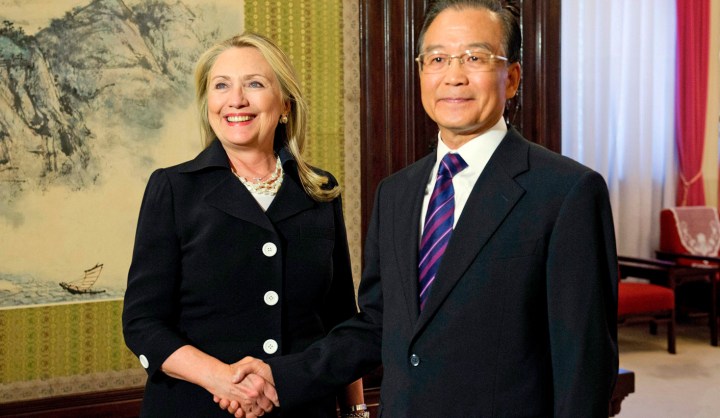World
The Beijing brush-off: Hillary Clinton visits China, to little effect

While her husband wowed the Democratic Convention with his patented combination of charm and political smarts, the almost-first female President of the United States of America was in China, shaking hands. As it happens, those hands desperately needed to get shook. By RICHARD POPLAK.
BEIJING—This city’s broad, Soviet boulevards would be untroubled by the landing of a convoy of 747s, let alone a motorcade belonging to the US Secretary of State. Here, in China’s first city, there’s hardly a peep coming from the diplomatic fraternity, despite the fact that Hillary Clinton arrives at a time when Sino-US relations are at something of a, well—it’s business as usual, which can’t be a good thing.
If the Chinese were watching the Republican Convention last week—and there’s no reason to suggest that they weren’t—they would have caught Mitt Romney in all his Sino-bashing glory. “If I’m president of the United States,” bloviated Mitt, “on Day 1, I will declare China a currency manipulator, allowing me to put tariffs on products where they are stealing American jobs unfairly.”
That no such thing would happen on Day 1, Day 2 or Day 400 is not lost on the Chinese. Without Beijing buying US Treasury bonds, Washington DC would look like Juba within a matter of weeks. The two countries are so interdependent they might as well be the principles in a Married…With Children reboot. Only a fool would start his presidency off on a belligerent foot.
That said, there is no doubt that Washington would love to see China loosen its monetary policy, but it also can’t afford the country’s growth to slow down any more than it has already. China is built on selling cheap stuff, and America is built on buying that cheap stuff. Until the balance shifts—and it can only do so in increments—this is the status quo we all have to live with.
While never belligerent, per se, the Obama administration has hardly been conciliatory. They’ve backed off a bit on human rights, but were forced to accept two unwanted Chinese citizens into their embassies in the past couple of years: Disgraced Bo Xilai’s consigliere Wang Lijun, and blind human rights lawyer Chen Guangcheng. Both situations were played with a deft diplomatic hand, proving that America’s on-the-ground China heads know their business.
But China and America are indeed light years apart on an array of issues, some of them serious, all of which make the embassy pop-ins look benign by comparison. The two major wedges are Syria and the South China Sea. And no party is willing to budge on either.
Astoundingly, Syria is the simpler of the two issues. China, along with Russia, refuses to back further sanctions or multilateral intervention in the Assad regime’s violent crackdown. For both China and Russia, Syria represents their last foothold in the region; should Assad go, their influence in the Middle East is reset at zero. China has vetoed three resolutions at the United Nations, and the meeting with Ms. Clinton made it clear that they would veto many more. “I think history will judge that China’s position on the Syrian question is a promotion of the appropriate handling and resolution,” said Yang Jiechi, China’s Foreign Minister.
That he’s wrong doesn’t change the fact that the South China Sea makes Syria look like a romcom. While America has upped its presence in the Pacific, committing very big boats and lots of resources to their eastern purview, China is involved in a range of territorial disputes with American allies, none of which are easily resolved, and several of which could lead to war.
It comes down to a territorial obsession with rocks. The Paracel Islands, barely Google Map-able, are claimed by both China and Vietnam; China has now established both a garrison and a legislative assembly there, firing up tensions. They’ve blocked the Scarborough Shoals to the Philippines. And they’re involved in another dangerous spat with the Japanese.
Beijing warns that it will take the “necessary measures” to protect the tiny Diaoyu Islands—the Senkaku Islands, as far as Tokyo is concerned—from Japanese nationalist forces looking to claim them. The provenance of the islands, which are deserted but said to lie close enough to oil reserves to matter, has become another major issue between China and Japan in recent weeks. It doesn’t help that America administered the islands from 1945 to 1972, and is generally compelled to back Japan is this species of contretemps.
One of Ms Clinton’s jobs here in Beijing, the last stop on a ten-day tour of Asia, was to try and get China to douse the flames on some of these flare-ups. In this, her visit has been a failure. Mr Yang spoke flatly, especially on the South China Sea: “China has sovereignty over the islands of the South China Sea and the adjacent waters,” he said. End of story.
The trip was Clinton’s last at-bat in China: she has promised to step down in January, regardless of whether President Obama wins a second term. Her husband’s rousing address to the Democratic Convention was seen not only as an endorsement of Obama, but also as spadework for his wife’s potential second run at the Democratic ticket come 2016. For her part, Ms Clinton insists that she wants to return to the global charity work that has become the Clinton family brand. But isn’t that what they all say?
Over the course of her tenure, Ms Clinton has always viewed China with the sort of pragmatism that the relationship so desperately needs. But she has stepped on toes, particularly when it comes to Africa. In an address on Zambian television during an Africa trip last year, Ms Clinton offered the following not so enigmatic comments:
“We saw that during colonial times, it is easy to come in, take out natural resources, pay off leaders and leave. And when you leave, you don’t leave much behind for the people who are there. We don’t want to see a new colonialism in Africa.”
That she was referring to China was missed by no one, particularly the Chinese and their African pals. The jury is still out on whether China in Africa has been a positive or a negative, but the verdict on America in Africa was delivered a long time ago: guilty as charged. It’s another pocket of foreign policy that highlights the differences.
So perhaps the China and America relationship is indeed a version of Married…With Children: embattled spouses arguing over their patch of the suburban manse, pushed and pulled by the needs of their dependents, forced to consume the same horrendous tuna casserole night after night. Whatever Mitt Romney pretends he’ll do on Day 1, he’ll be forced to think twice. The world is big enough for China and America. But just barely. DM
Read more:
- “No movement on key disputes as Clinton meets with Chinese leaders” in the New York Times
Photo: Incoming African Union Mission in Somalia (AMISOM) Force Commander Lieutenant General Andrew Gutti inspects a Ugandan guard of honour at Mogadishu Stadium, in this handout photograph taken April 25, 2012, and released by the African Union (AU)-United Nations (UN) Information Support Team on April 26, 2012. REUTERS/Stuart Price/AU-UN IST

















 Become an Insider
Become an Insider